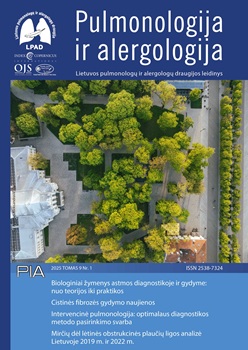BIOMARKERS IN ASTHMA DIAGNOSIS AND TREATMENT: FROM THEORY TO PRACTICE
Abstract
Asthma is a heterogeneous airway disease that requires endotype-based management. Biomarkers are becoming essential for targeted diagnosis and treatment. Aim of the study. To review key biomarkers associated with asthma endotypes, emphasizing differences between type 2 and non-type 2 inflammation and emerging molecular targets. Methods. A systematic literature review was conducted using PubMed, Scopus, and Google Scholar databases, covering publications from 2020 to 2024. Results. Eosinophil counts, fractional exhaled nitric oxide (FeNO), immunoglobulin E (IgE), and micro ribonucleic acid (miRNA) expression profiles help differentiate asthma phenotypes. Periostin, YKL-40, and galectin-10 show promise as alternative biomarkers. Differential expression of eosinophil subtype-specific miRNAs (e.g., miR-185-5p, miR 21-5p) may aid endotype prediction. Conclusions. Incorporating biomarkers into asthma management could enhance personalized treatment. Clinical validation and further identification using multi-omics approaches are essential.


